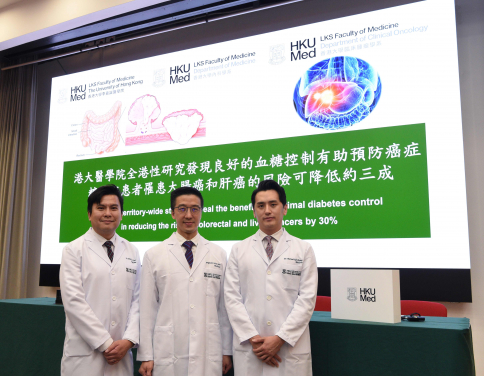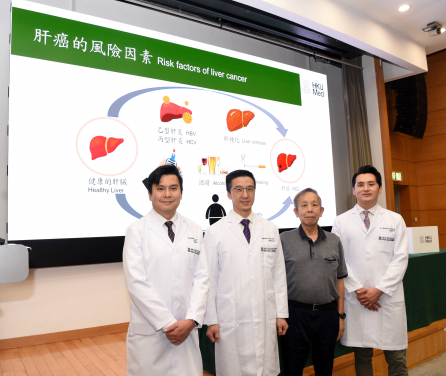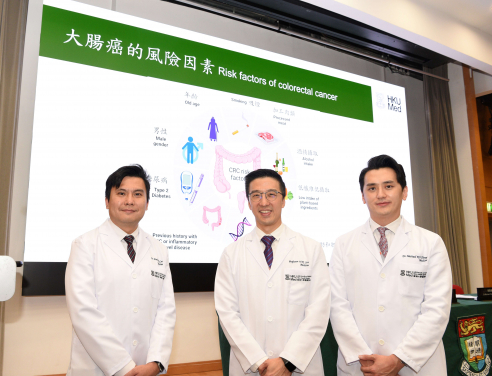Media
HKUMed territory-wide studies reveal the benefits of optimal diabetes control in reducing the risk of colorectal and liver cancer by 30%
30 Oct 2024

HKUMed research indicates that stringent diabetes management is an effective oncopreventive strategy for colorectal and liver cancer.

A HKUMed territory-wide study revealed that optimal control of diabetes significantly reduced the risk of colorectal and liver cancer by 28% and 30%, respectively. (From left) Dr Paul Lee Chi-ho, Professor Walter Seto Wai-kay, Mr Chan, who had diabetes and liver cancer, and Dr Michael Cheung Ka-shing

HKUMed research indicates that stringent diabetes management is an effective oncopreventive strategy for colorectal and liver cancer.

HKUMed research indicates that stringent diabetes management is an effective oncopreventive strategy for colorectal and liver cancer.

A HKUMed territory-wide study revealed that optimal control of diabetes significantly reduced the risk of colorectal and liver cancer by 28% and 30%, respectively. (From left) Dr Paul Lee Chi-ho, Professor Walter Seto Wai-kay, Mr Chan, who had diabetes and liver cancer, and Dr Michael Cheung Ka-shing
- 1 / 3
- 2 / 3
- 3 / 3
Colorectal cancer and liver cancer are the second and fifth most common cancers in Hong Kong, respectively, and both are associated with notably high mortality rates. This underscores the urgent need to develop effective strategies to combat these formidable diseases. A joint research team from the Department of Medicine and the Department of Clinical Oncology, both under the School of Clinical Medicine in the LKS Faculty of Medicine of the University of Hong Kong (HKUMed), conducted two territory-wide studies using data from the Hospital Authority, spanning up to 17 years, to identify over 140,000 patients with diabetes. The results revealed that optimal control of diabetes significantly reduced the risk of colorectal and liver cancer by 28% and 30%, respectively.
The findings indicate that stringent diabetes management is an effective oncopreventive strategy for colorectal and liver cancer. The findings are considered clinically significant and have gained attention from the medical sector worldwide. The results were published in internationally renowned medical journals Gut (link to publication) and Alimentary Pharmacology & Therapeutics (link to publication).
Background
Diabetes Mellitus (DM) is a known risk factor for doubling the risk of developing colorectal and liver cancer. As the prevalence of DM is increasing at an alarming rate globally, soaring from 148.5 million in 1990 to 437.9 million in 2019, the number of diabetic patients at risk for these cancers is expected to increase further. While better control of diabetes has been proven effective in preventing cardiovascular and renal diseases, its potential in cancer prevention has not yet been thoroughly explored in large-scale studies. To address this gap, the HKUMed research team conducted two territory-wide studies to investigate the relationship between control of diabetes and the risks of developing colorectal and liver cancer.
Colorectal cancer and liver cancer rank as the third and sixth, respectively, most common cancers worldwide. Colorectal cancer develops from colorectal adenomas, which are abnormal growths or polyps in the intestinal lining that can gradually evolve into cancer. Although screening for colorectal cancer has been shown to significantly reduce both its incidence and mortality rate, screening remains insufficiently widespread. As for liver cancer, antiviral treatments can reduce the cancer risk by only half among patients with chronic hepatitis B infection. Consequently, additional oncopreventive strategies against these two cancers are imperative.
Research method and results
The research team retrieved the clinical information of newly diagnosed DM patients, using the electronic registry database of the Hospital Authority. Their primary focus was to compare the effects of optimal control of diabetes (mean HbA1c < 7%) against suboptimal control of diabetes (HbA1c of ≥7%) on the risk of colorectal and liver cancer among these patients.
About the colorectal cancer study
The research team identified 88,468 newly diagnosed DM patients between 2005 and 2013, 53.3% of whom were male. The mean age was 61.5 (±11.7 years). Over a follow-up period of up to 13 years, 1,229 patients (1.4%) developed colorectal cancer. The findings indicated that optimal control of diabetes, as opposed to suboptimal control of diabetes, reduced the risk of colorectal cancer by 28%. The overall risk of colorectal cancer increased with a higher mean HbA1c level, showing a 34%, 30%, 44% and 58% increased risk for HbA1c levels of 7.0% to <7.5%, 7.5% to <8.0%, 8.0% to <8.5%, and ≥8.5%, respectively. In addition, the findings revealed that optimal control of diabetes lowered the risk of colorectal adenoma by 13% compared to suboptimal control of diabetes.
About the liver cancer study
Between 2001 and 2016, the research team identified 146,430 newly diagnosed DM patients, 52.2% of whom were male. The mean age was 61.4 (±11.8 years). Over a follow-up period of up to 17 years, 1,099 (0.8%) patients developed liver cancer, 1,430 patients (1.0%) experienced liver decompensation, and 978 (0.7%) patients died from liver-related diseases. Optimal control of diabetes was found to be associated with a 30% lower risk of liver cancer, a 24% lower risk of liver decompensation, and a 30% lower risk of liver-related mortality compared to suboptimal control of diabetes. The research team also observed a stepwise increase in the trend of liver cancer risk based on rising HbA1c levels. Patients with HbA1c levels from 7.0% to <8.0%, 8.0% to <9.0% and ≥9% had a 29%, 67% and 71% higher risk of liver cancer, respectively. The oncopreventive benefits were particularly prominent in high-risk individuals, including those with chronic hepatitis B or C infection and fatty liver disease.
Significance of the studies
Leading these two studies, Professor Walter Seto Wai-kay and Dr Michael Cheung Ka-shing, both from the Department of Medicine under School of Clinical Medicine at HKUMed, stated, ‘These studies emphasise the significance of achieving optimal control of diabetes in patients with DM to lower the risk of developing colorectal and liver cancer. The findings provide insights into additional oncopreventive strategies to reduce risk of colorectal and liver cancer development beyond colorectal cancer screening and antiviral therapies. We hope this study will promote greater awareness of the importance of diabetes control among patients and encourage them to take an active role in managing their health.’
About the research team
The HKUMed research team includes Professor Walter Seto Wai-Kay, Simon KY Lee Professor in Gastroenterology and Clinical Professor; Dr Michael Chueng Ka-shing, Clinical Associate Professor; Professor Yuen Man-fung, Chair Professor and Chief of the Division of Gastroenterology and Hepatology; Professor Leung Wai-keung, Li Shu Fan Medical Foundation Professor in Gastroenterology and Clinical Professor; Dr Mak Lung-yi, Clinical Assistant Professor; Dr Paul Lee Chi-ho, Clinical Associate Professor in Endocrinology, in the Department of Medicine, School of Clinical Medicine; and Dr Chiang Chi-leung, Clinical Assistant Professor in the Department of Clinical Oncology, School of Clinical Medicine.
Media enquiries
Please contact LKS Faculty of Medicine of The University of Hong Kong by email (medmedia@hku.hk).
